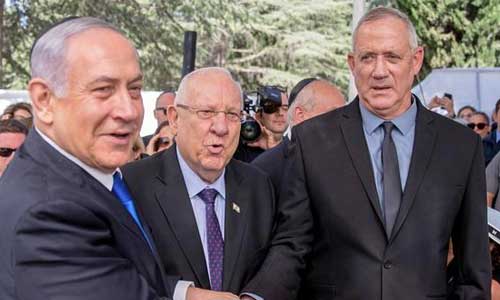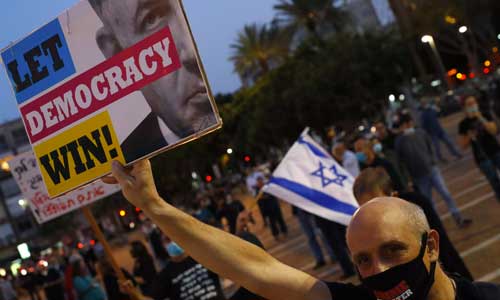
|
|
|
|
|

|
The prospect of new elections has been in the cards for months, with tensions coming to a head over budget negotiations. Remaining at an impasse as they approached a key deadline to pass a budget Tuesday night, both Gantz and Netanyahu agreed to a short-term extension.
But by morning, a series of Likud and Blue and White MKs broke ranks with their leaders and torpedoed the extension vote. The failure to pass the extension triggered the end of the coalition agreement, the dissolution of the Knesset and fresh elections next March.
In dramatic scenes in the early hours of Tuesday morning, a series of Likud and Blue and White MKs broke ranks with their leaders and torpedoed the extension vote. The failure to pass the extension triggered the end of the coalition agreement, the dissolution of the Knesset and fresh elections next March.
Keenly aware of how unpopular a return to the ballot box will be for voters, both Gantz and Netanyahu are blaming each other for the failure, with neither man heading into the next election in a strong position.
Gantz has collapsed in the polls; Only four percent of Israelis want him to serve as Israel's next PM. Netanyahu, meanwhile, faces a serious electoral threat from minister-turned-rival Gideon Sa’ar, who last month split from Likud to launch a rival right-wing party, New Hope, which appears to have drawn support from both Gantz and Netanyahu.
|
|
|
|

|
While Israel’s previous three elections resulted in largely similar deadlocked results, there’s reason to believe this time could be different.
The collapse in support for Benny Gantz and the strong polling results for renegade Likud MK Gideon Sa’ar mean that Netanyahu now faces a greater threat from right-wing parties than from the center-left. Their surging support and the fact that his right-wing opponents are more culturally, politically and ideologically aligned than those on the center-left means this is likely to be Netanyahu’s toughest challenge yet.
Already, Sa’ar’s right-wing ‘New Hope’ party is polling at 19 seats in the 120 seat Knesset, taking seats from Netanyahu’s Likud (now polling at 28 seats, down from 36) and Blue and White (now polling at five seats, down from 14). The far-right Yamina coalition, led by Neftali Bennet, is also surging in support (now polling at 14 seats, up from six).
For the thousands of Israelis who rallied together over the summer to protest Netanyahu’s increasingly autocratic and corrupt leadership, this election may represent the best opportunity yet to end Netanyahu’s long-running grip on Israeli politics.
For Palestinians, however, a new right-wing government without Netanyahu at the helm would mean little change to the dynamics of the conflict. In a leadership vote earlier this year, Sa’ar won the strong backing of the settler movement and has a record of fierce opposition to a two-state peace agreement.
For the center-left, the elections couldn’t come at a worse time.
Benny Gantz’s decision to partner with Prime Minister Netanyahu earlier this year fractured the Blue and White party right down the middle, halving its seats and leading to a steady ebb in support. The party now risks falling below the 3.25% Knesset entry threshold.
Other parties to the left also face a potential wipeout, with Israeli voters potentially set to eject the once-mighty Labor party from the Knesset altogether. The Joint List of majority Arab parties, meanwhile, is struggling with its own internal divisions and may not run together on a joint slate.
|
|
The beginning of the end for Netanyahu?
|
|

|
Prime Minister Netanyahu initially scored high marks for his early handling of the COVID-19 crisis, but that quickly gave way to frustration, anger and protests as the economic impact worsened and cases began to spike higher than ever before. The PM also continues to face ongoing pressure from legal proceedings related to multiple corruption charges and a reputation for dishonesty and self-dealing. Prosecutors are expected to present evidence in his corruption trial in February.
Netanyahu has banked several political wins since the last election, however.
Most significantly, the Prime Minister achieved landmark normalization agreements with Bahrain, the UAE, Sudan and Morocco. The past few months have also seen a significant increase in settlement activity and demolitions of Palestinian homes, key priorities for the far-right settlement movement, which has been bitter ever since Netanyahu paused his plans to annex vast swathes of the West Bank.
Netanyahu’s security and foreign policy credentials were also boosted last month with the prime minister all but confirming a groundbreaking secret meeting with the crown prince of Saudi Arabia. November also saw the assassination of Iran’s top nuclear scientist, which Israeli sources took credit for in the pages of the New York Times.
All this plays into the prime minister’s positioning of himself as “Mr Security.”
Still, the challenge from an increasingly unified anti-Netanyahu majority may prove too much for Israel’s longest-serving prime minister to overcome. Netanyahu’s task over the next three months of campaigning will be threefold: bring down Gideon Sa’ar as a viable alternative, reclaim ground from parties to Likud’s right and divide and conquer the anti-Netanyahu coalition on the right and center.
Just like the last three campaigns, we should expect the weeks ahead to be filled with increasing division, calculated racism, new attempts at voter suppression and a continuation of absurdly over-the-top political attacks.
|
|
|
|
|
|

|
J Street is the political home for pro-Israel, pro-peace Americans who want Israel to be secure, democratic and the national home of the Jewish people. Working in American politics and the Jewish community, we advocate policies that advance shared US and Israeli interests as well as Jewish and democratic values, leading to a two-state solution to the Israeli-Palestinian conflict.
This email has been sent to [email protected]. Too much email? Change your subscription settings or unsubscribe here. Email not displaying correctly? View here.
|
|
|